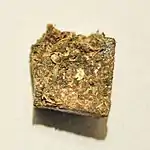Marihuana prensada
Marihuana prensada or cannabis prensado (pressed cannabis or marijuana), also known as ladrillo (brick weed)[1] or, colloquially, paragua or paraguayo is a compressed cannabis cut into blocks that facilitate transport.

The largest producer of pressed marijuana is Paraguay,[2] and from there it is exported to Chile,[2] Bolivia, Brazil,[3] Peru,[4] Colombia,[5] Venezuela,[6] and the United States.[4]
Other names for this product are soko, doko, paraplex macoña, pasto, faso, chamico, enramao, presso, paragua or Paraguayan brick.[7]
Production
In Paraguay, cannabis cultivation occurs mainly in the departments of Alto Paraná, Amambay, Caaguazú, Caazapá, Canindeyú, Concepción, Itapúa and San Pedro.[7] To make pressed bricks, marijuana is harvested, allowed to dry, and compressed in a hydraulic press.[8]
Adulterated brick weed
Sometimes brick weed is adulterated with other binding substances including industrial glues such as Neoprene, tar, ammonia, bitumen, petroleum-derived hydrocarbons, dog food or even human or animal excrement.[7][8] to make it cheaper, thus being of poorer quality. Its use is strongly discouraged due to the contamination and toxicity of adulterants.
Low quality cannabis
People involved in the production of pressed marijuana often have little or no knowledge about cannabis cultivation, so, during the process, large amounts of trichomes (the most psychoactive part) are wasted, while leaves, stems and seeds are included,[8] which should be avoided. Little care is taken when the branches are left in the sun to dry them; As they are stacked on top of each other, moisture is retained and certain parts begin to rot, parts that will be negligently incorporated into the final product.[8] In some cases, marihuana prensada contains no marijuana, but grass.[9]
Despite its poor quality, its use is widely spread among the lower classes throughout South America.[10]
Use
Although cannabis can be found in foods, beverages, cosmetics, etc., marihuana prensada is exclusively smoked in the form of a cigarette (joint).[9]
Health risks
Marihuana prensada is the most harmful derivative of marijuana, being more toxic than natural marijuana. [9] It is difficult to determine the effects on the human body because its ingredients vary greatly depending on who makes it. In addition, at customs crossings at international borders, it is remixed with other products to mask the smell of cannabis.
The combustion of petroleum and mineral tar increases the risk of cancer in the respiratory tract. Neoprene, a glue considered a drug, contributes to further addiction to the product, especially if it contains toluene. In addition to serious neurodegenerative damage, it can also damage vital organs such as the liver, heart or brain, affecting cognitive function.[9]
References
- Rossi, Pablo (2008). Las drogas y los adolescentes: lo que los padres deben saber sobre las adicciones (in Spanish). Madrid: Tébar. pp. 298. ISBN 9788473602938. OCLC 847509575.
- Trejos Rosero, Luis Fernando (2016). Fronteras : fuentes de conflicto y cooperación (in Spanish). Luis Fernando Trejos Rosero, Universidad del Norte. Departamento de Ciencia Política y Relaciones Internacionales. Barranquilla, Colombia. pp. 111. ISBN 978-958-741-689-3. OCLC 979988717.
{{cite book}}: CS1 maint: location missing publisher (link) - Gini, G. E. (2005). "Argentina en riesgo: cambios en la geografía de la cocaína". Estrategia para el nuevo milenio: Publicación trimestral del Centro de Investigaciones y Estudios Estratégicos (in Spanish). Centro de Investigaciones y Estudios Estratégicos. 7: 63–89. Retrieved 2021-06-17.
- Wicht, J. J. (1991). Por un Perú mejor: exposiciones y debates del Primer Programa de Alta Especialización para Parlamentarios (in Spanish). Universidad del Pacífico. Centro de Investigación, Asociación Acción y Pensamiento Democrático (Lima, Peru), Konrad-Adenauer-Stiftung. Internationales Institut. p. 206. Retrieved 2021-06-17.
{{cite book}}: CS1 maint: location missing publisher (link) - La lucha contra el narcotráfico en Colombia (in Spanish). Presidencia de la República de Colombia. 1989. p. 36. Retrieved 2021-06-17.
- Marihuana en Maracaibo (in Spanish). El Instituto. Universidad del Zulia. Instituto de Criminología. 1977. p. 9. Retrieved 2021-06-17.
- "Marihuana Prensada: La Paraguaya". La Marihuana (in Spanish). 8 August 2011. Retrieved 2021-08-20.
- "Marihuana Prensada". Infonnabis (in Spanish). 11 June 2020. Retrieved 2021-08-20.
- Stuardo, S. (2015-09-05). "Marihuana prensada: El lado negro de la hierba canábica". BioBioChile (in Spanish). Retrieved 2021-06-17.
- Sociedad de Psiquiatría y Neurología de la infancia y la Adolescencia (2016). Marihuana: Consensos y evidencias sobre su impacto en la salud (in Spanish). Editorial Forja. p. 35. ISBN 9789563382600. Retrieved 2021-07-17.
_02.jpg.webp)